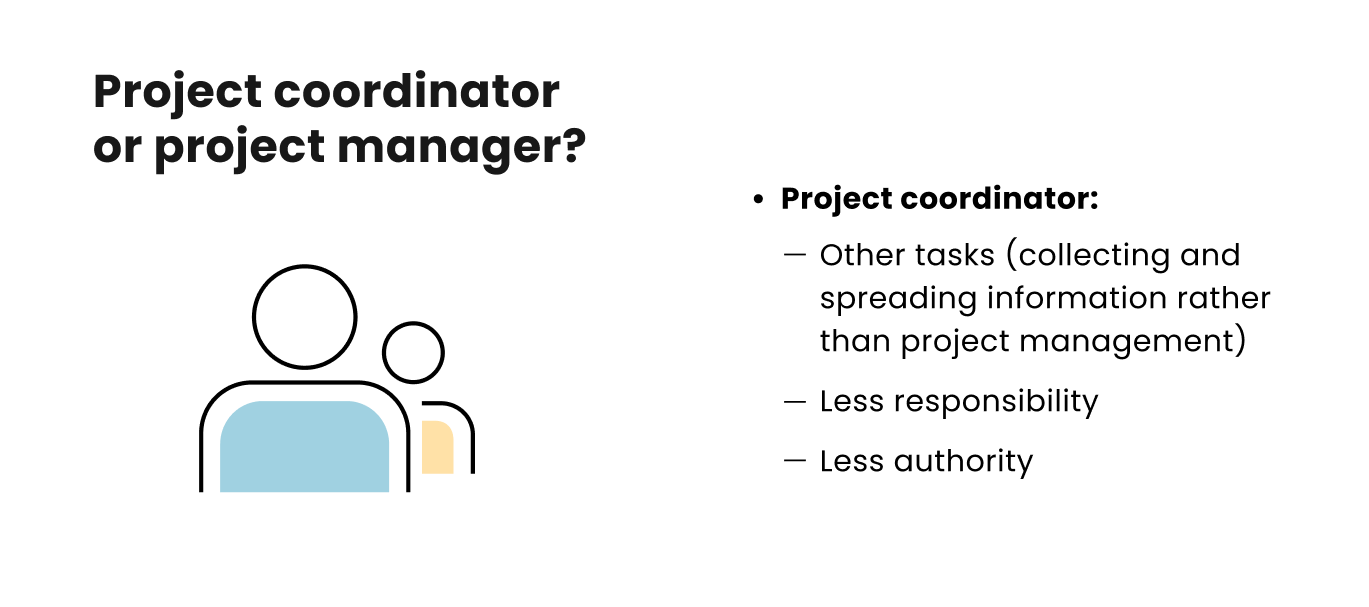What is a Project Coordinator? Responsibilities and Job Description
March 27, 2024 · 10 min read
In previous articles, we've extensively covered the role of a manager—a person who coordinates a team to collaboratively fit within the project triangle, ensuring that key stakeholders remain satisfied.
Another role that stands out is a project coordinator. This article delves into the nuances of the project coordinator role, its responsibilities, limitations, and how it compares to that of a project manager.
What is a Project Coordinator?
A project coordinator is a professional who supports the project management team by handling various administrative tasks and ensuring that the project runs smoothly. They act as a bridge between the project manager and the project team, ensuring that all aspects of the project are on track. Coordinators often work in various industries, including construction, IT, healthcare, and more, providing essential support in project execution.

What Does a Project Coordinator Do?
The project coordinator role is often seen as complementary to that of a manager. In specific organizational structures, such as functional or weak matrix ones, where a manager's presence might not be constant, the coordinator steps in to perform a subset of the manager's duties.
Their main interaction is with the team, ensuring that members are reminded of the established plans (which they did not formulate or supervise), monitoring progress, and gathering feedback. Key responsibilities of a project coordinator include:
- Organizing and updating the project schedule: Based on team member inputs and progress reports, they adjust timelines and ensure all stakeholders are informed of any changes.
- Facilitating communication: Ensuring clear communication channels among team members and stakeholders, coordinating meetings, and disseminating important information.
- Monitoring progress: Keeping track of the project's progress, identifying any issues or delays, and reporting these to the project manager.
- Administrative support: Handling documentation, preparing reports, and maintaining project files.
It's important to note, however, that project coordinators have defined limitations. They lack the authority to issue directives, make alterations to plans, or decide independently.
The Essence of the Project Coordinator
Despite the constraints, the existence of coordinators in more robust organizational structures is considered a best practice. They not only assist managers but also serve as a nurturing ground for developing future managerial talent, embodying one of the most effective ways to cultivate strong leaders within a team.
To illustrate, consider a software development project. Here, the project coordinator might be responsible for organizing and updating the project schedule based on team member inputs.
For example, if a task is projected to take longer due to unforeseen technical challenges, the coordinator adjusts the schedule accordingly and communicates this change to all stakeholders.
However, they do not possess the authority to approve budget adjustments or deadline extensions; such decisions must be escalated to the project manager.
While project managers are deeply involved in planning and supervision, setting objectives, defining scope, and determining resources, coordinators primarily support the execution phase. This support includes organizing meetings, updating schedules, and facilitating communication among stakeholders.
Project Coordinator vs. Project Manager
This example brings us to the comparison between project managers and coordinators.
Project Managers:
- Autonomy: They have the autonomy to make critical decisions, including those affecting the budget, deadlines, and strategic direction.
- Responsibilities: Involved in planning and supervision, setting objectives, defining scope, and determining resources.
- Authority: Can approve budget adjustments, deadline extensions, and strategic changes.
Project Coordinators:
- Scope: Operate within a predefined scope, assisting in the execution of the plan set by the project manager without the power to make project-altering decisions.
- Support Role: Organize meetings, update schedules, and facilitate communication among stakeholders.
- Limitations: Cannot approve budget changes or major strategic decisions; these must be escalated to the project manager.
Project Coordinator Salary
The salary of a project coordinator can vary widely depending on the industry, location, and level of experience. On average, a project coordinator in the United States can expect to earn between $45,000 and $65,000 per year. Entry-level positions may start at a lower range, while those with extensive experience or working in high-demand sectors might earn more. Additional benefits and bonuses can also play a significant role in the total compensation package.
Career Path and Development
The journey from a project coordinator to a manager is one of significant learning and development. As coordinators engage in project management practices, team coordination, and stakeholder communication, they amass valuable experience from a supportive standpoint. This foundation is crucial for assuming the more comprehensive responsibilities of a project manager in the future.

Essential Skills for a Project Coordinator
To excel in their role, project coordinators must possess a specific set of skills:
- Organizational Skills: Ability to manage multiple tasks and keep track of various project components.
- Communication Skills: Proficiency in both written and verbal communication to effectively liaise between team members and stakeholders.
- Time Management: Skill in prioritizing tasks and managing time to meet deadlines.
- Problem-Solving: Capability to identify issues early and propose solutions or escalate them to the project manager.
- Technical Proficiency: Familiarity with project management software and tools to manage schedules and documentation.
Common Challenges Faced by Project Coordinators
Project coordinators often encounter several challenges in their role, including:
- Scope Creep: Managing changes to the project scope that have not been formally approved, which can affect timelines and budgets.
- Resource Allocation: Ensuring that team members have the necessary resources and support to complete their tasks.
- Stakeholder Expectations: Balancing the expectations of various stakeholders while maintaining project objectives.
- Communication Breakdowns: Overcoming barriers to effective communication among team members, particularly in remote or distributed teams.
The Importance of Project Coordinators in Various Industries
Project coordinators play a crucial role across different industries. In construction, they might manage timelines and ensure compliance with safety regulations. In IT, they support the development process by coordinating between developers and clients. In healthcare, they assist in managing clinical trials or the implementation of new health systems. Each industry leverages the unique skills of project coordinators to maintain efficiency and ensure project success.
Certifications and Training for Project Coordinators
To advance their careers, project coordinators can pursue various certifications and training programs that enhance their skills and knowledge:
- Certified Associate in Project Management (CAPM): Offered by the Project Management Institute (PMI), this certification is ideal for those new to project management.
- Project Management Professional (PMP): Also from PMI, this certification is more advanced and requires extensive project management experience.
- Agile Certifications: Certifications like Certified ScrumMaster (CSM) or PMI-Agile Certified Practitioner (PMI-ACP) are beneficial for coordinators working in agile environments.
- Continuous Learning: Attending workshops, webinars, and other training programs helps coordinators stay updated with the latest project management trends and practices.
Leveraging Technology in Project Coordination
Project coordinators can significantly enhance their effectiveness by leveraging various technologies:
- Project Management Software: Tools like Microsoft Project, Asana, Trello, JIRA and Planyway help in planning, tracking, and managing project tasks.
- Communication Tools: Platforms like Slack, Microsoft Teams, and Zoom facilitate better communication and collaboration among team members.
- Document Management Systems: Tools like Google Drive, SharePoint, and Dropbox ensure that project documentation is organized and easily accessible.
- Time Tracking Software: Applications like Planyway, Toggl and Harvest help coordinators monitor time spent on different tasks and manage project timelines efficiently.
Conclusion
The role of a project coordinator is instrumental in maintaining the coherence and momentum of a project. Their defined responsibilities and constraints highlight the critical nature of their position in supporting project management and facilitating the smooth operation of project activities.
Moreover, their role within various organizational structures not only provides immediate support to project management but also plays a crucial role in the development of future managerial talent, making them an indispensable asset to any project team.


